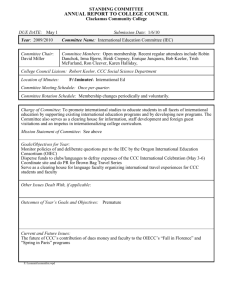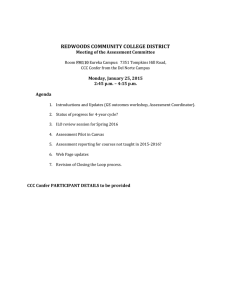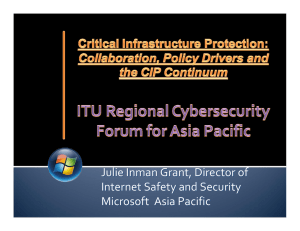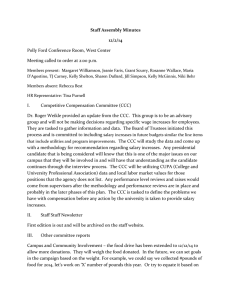The Council of Europe and Cybersecurity Prof. Mr.H.W.K.Kaspersen Council of Europe/Computer/Law
advertisement
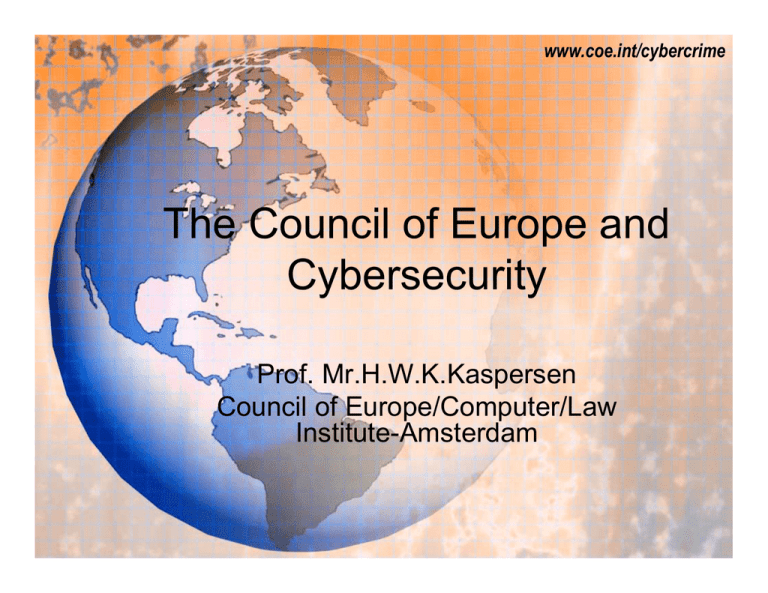
www.coe.int/cybercrime The Council of Europe and Cybersecurity Prof. Mr.H.W.K.Kaspersen Council of Europe/Computer/Law Institute-Amsterdam Council of Europe • 47 Member States • Build around Rome Treaty 1950 – Rule of Law – Human rights • International co-operation – Numerous areas: • From Racism and Data protection to Trafficking in human beings and Terrorism – Standing Tradition of Treaty Making: over 200 – Ample experience International Criminal Law • • • • Extradition Mutual Assistance Transfer of Pfroceedings Recognition of foreign court decisions 2001: Cybercrime Convention • Ambit of global aspiration – USA, Canada, Japan, South-Africa – Signatories: • Includes European Union • Includes G7 – Signatories: 44, of which – Ratifications: 23 • Potentially one of the Best Performing CoE Treaties More global aspiration • Model Law Function • Accession by Third Parties – Wide range of potential Parties • Costa Rica, Mexico, Philippines have been invited to accede • Legislative amendments (about to be) adopted in many other countries inspired by the Convention (Argentina, Brazil, Caribbean countries, Colombia, Dominican Republic, Egypt, India, Indonesia, Nigeria, Philippines, Sri Lanka etc.) Accession to the Convention under consideration – Assistance by CoE – Requests for Accession – Consent of Sitting Parties Aims of the Cybercrime Convention • Harmonisation of substantive criminal law – – – – No data havens! Dual criminality Cybercrime in narrow sense Cybercrime in broader sense • Harmonisation of investigative powers – Capacity to collect electronic evidence – Preservation power – Production of data, including traffic data – Internet surveillance Aims CCC- cont’d • International co-operation – On the basis of the Convention – Existing bi- and multilateral instruments – Expedited assistance • Through: 24/7 contact points (integrated with G8-network) • MLA: preliminary measures, modern means of communication CCC perfect solution? • Problem areas – Extraterritorial Jurisdiction • Art. 22 CCC reasonably in place but…. – Executive Jurisdiction • Art. 32 CCC: extraterritoriality highly controversial, but….. • Lack of sense Sense of Urgency? – Very low rate of solved cases – Emphasis on Domestic cases Additional measures CoE • Cybercrime Project – Co-ordination – Consultation with industry (Codes of Best Practice, co-operation with LEA) – Exchange of experience, methods and tools: 24/7, specialised LEA-units – Training, legal advice – Development of new concepts: TC-CY Supporting the CCC • European Union • Industry – Software – Security • UN – Bangkok Summit 2005 – IGF Rio de Janeiro 2007 • ITU –? Concluding Observations • Need to move forward with full energy: – Technology does not wait – International co-operation should be improved • Support from (inter)national bodies and institutions indispensable • Launching alternative legal instruments is counterproductive, may cause confusion and slows down the process – If CCC could be considered as a wheel… – CCC should be recognised as the global instrument and achievement – CCC is an adequate vehicle for improvement of international co-operation • ITU: invite State Parties to sign and ratify CCC
